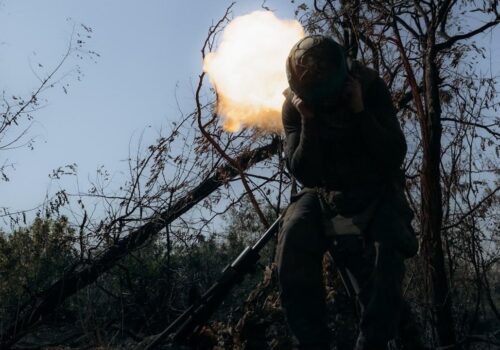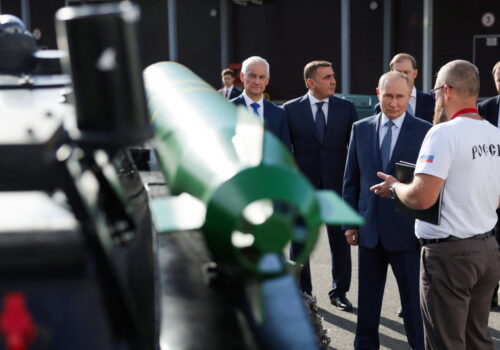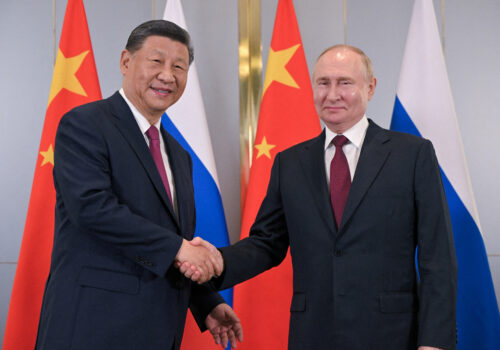Watch the full event
Russian President Vladimir Putin has not heeded President-elect Donald Trump’s November 7 warning to not escalate the war in Ukraine, said US Congressman Michael McCaul (R-TX).
“He has not taken the president-elect’s advice,” McCaul said. “In fact, what we’re seeing is almost a counteroffensive now.”
McCaul, who is the outgoing chairman of the House Foreign Affairs Committee, spoke at an Atlantic Council Front Page event on Thursday, hosted by the Council’s Eurasia Center. There, he talked about the threats Russian aggression in Ukraine pose for US interests—and how the United States should respond.
He said that the Biden administration’s recent decision to allow Ukraine to use longer-range Army Tactical Missile Systems (ATACMS) to strike targets in Russia is “better late than never.” He pointed out that these systems will support the fight in the Kursk region of Russia, where Ukrainian troops are facing both Russian and North Korean soldiers.
But the ATACMS will also serve another purpose, McCaul argued: They give Ukraine leverage in negotiations. “If and when the moment happens where a ceasefire is declared and a negotiation takes place,” he said, “Ukraine has to be in the strongest possible position with the most leverage to get the best negotiation at the table. Right now, they’re not there.”
Below are more highlights from the conversation—moderated by Atlantic Council Eurasia Center Senior Director John Herbst—in which the congressman also discussed how the United States will need to face up against a new “unholy alliance” emerging among Russia, China, Iran, and North Korea.
Hard road ahead
- With Trump soon to re-enter the White House, there is fresh attention on the president-elect’s “peace plan” for Ukraine, of which few details are known. McCaul said that because Putin “wants all of Ukraine,” any unfolding negotiation is “not going to be easy.”
- If a negotiation leads to an agreement, McCaul argued, the deal will need an “enforcement mechanism” to make sure Russia does not continue its aggression.
- McCaul criticized the Biden administration for “slow walking” promised defense aid for Ukraine. “If we’re only halfway in this thing, you get into a stalemate. And if you get into a stalemate, Russia wins,” he said.
A “moral obligation” for the United States
- McCaul said that if Russia wins, the United States would look “weaker” on the world stage. That, he said, would “invite more aggression” from Putin, which would likely result in the swift fall of Moldova and Georgia and heightened threats against Eastern Europe—and would change Chinese leader Xi Jinping’s calculus on whether to invade Taiwan.
- With Russia suspected of weighing options for escalating its sabotage campaign against NATO countries, McCaul warned that Russia is “getting dangerously close” to triggering NATO’s collective defense commitment as enshrined under Article 5.
- When the US Congress passed the supplemental aid package for Ukraine in April, there were “a lot of courageous members that did the right thing,” McCaul said, but there were also members “who were afraid of their own shadows.” He added that upon returning to their districts, members didn’t receive the blowback that many were expecting for supporting the aid package—rather, they received praise for standing up to Putin.
- Ukrainian troops are “fighting this conflict for us,” he said. “It’s our moral obligation and responsibility to stop aggression where it exists, to defend freedom and democracy.”
Preparing for a Taiwan crisis
- Ukraine is “vital to our national interests,” McCaul argued, explaining that “if Ukraine falls, Taiwan is next. And that would be World War III.”
- The congressman said that he is particularly worried about a Taiwan-invasion scenario because it would severely hamper semiconductor manufacturing and trigger an economic “tailspin.”
- McCaul said that Taiwan has only received half of the twenty weapons systems the United States sold Taiwan five years ago. “That’s indicative of a global problem,” he said, in the “arsenal of democracy”—or the defense industrial base across democratic countries. “We need to change the way our procurement process works” at the Pentagon, he said, adding that defense contractors also will need to be “more agile and flexible.”
Alliance of adversaries
- McCaul explained that Russia, China, Iran, and North Korea have bonded together in a “formidable adversary alliance.”
- “They’re all in it together . . . you cannot separate them,” he said, pointing to Putin’s welcoming Hamas to Moscow, Putin and Xi’s 2022 friendship declaration, and North Korea’s supply of troops to Russia, among other forms of collaboration.
- “When we’re divided,” he said, “our adversaries and [enemies] see weakness. So this is incredibly important, that we stick together on this.”
Further reading
Mon, Nov 18, 2024
Putin got into Biden’s head about ‘red lines’ in Ukraine. Trump must not be as timid.
New Atlanticist By John E. Herbst
News that the Biden administration will allow Kyiv to use Army Tactical Missile Systems (ATACMS) against military targets in Russia is welcome but overdue.
Tue, Nov 5, 2024
To counter the Axis of Evasion, the US must tackle third-country procurement networks
New Atlanticist By Kimberly Donovan
Russia, China, Iran, and North Korea are increasing their coordination with illicit procurement networks through third countries.
Sat, Sep 28, 2024
The US confronts two global threats: China-Russia and itself
Inflection Points By Frederick Kempe
The disruptive dangers of the Chinese-Russian combination can only be contested and contained by steady, confident, far-sighted US leadership alongside partners and allies.
Image: Representative Michael McCaul (R-TX) and Representative Dean Philips (D-MN) during a television interview at the US Capitol, in Washington, DC, on Thursday, September 28, 2023. Photo by Graeme Sloan/Sipa USA via Reuters.



